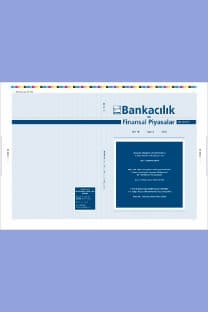urkish Banks and Digitalization: Policy Recommendations from a Qualitative Study
Türk Bankaları ve Dijitalleşme: Nitel Bir Çalışmadan Elde Edilen Politika Önerileri
___
1. Accenture, (2017), Redefine Banking with Artificial Intelligence, www.accenture.com/_acnmedia/pdf-68/accenture-redefine-banking.pdf2. Akhavein, J., Frame, W.S. and White L.J.. (2005). The Diffusion of Financial Innovations: An Examination of the Adoption of Small Business Credit Scoring by Large Banking Organizations. Journal of Business, 78 (2): 577-596.
3. Capgemini, EFMA, (2019), World Retail Banking Report, www.capgemini. com/news/world-retail-banking-report-2019/
4. Cherowbrier, J. (2020), Number of active mobile banking customers in Turkey 2014-2018, www.statista.com/statistics/888594/turkey-number-of-active-mobile-banking-customers/
5. Comert, H. and Epstein, G.. (2016). Finansal Yenilik Yazınındaki Son Gelismeler, STPS Working Papers 1604, STPS - Science and Technology Policy Studies Center, Middle East Technical University, revised Jan 2016.
6. Davenport, T.H. and Westerman, G.. (2018), Why So Many High-Profile Digital Transformations Fail, Harvard Business Review, www.hbr.org/2018/03/ why-so-many-high-profile-digital-transformations-fail
7. Deloitte, (2018), EMEA Digital Banking Maturity Report, www2.deloitte. com/DigitalBankingMaturity
8. Ditshego, K.J.. (2018). Assessing the Influence of Digital Transformation on Digital Maturity within a Large Corporate Bank, North-West University, dissertation paper, www.repository.nwu.ac.za/handle/10394/30962
9. European Union, (2015), Payment Services (PSD-2) Directive (EU) 2015/2366, www.ec.europa.eu/info/law/payment-services-psd-2-directive-eu-2015-2366_en
10. Gsell, S. and Mette, J.. (2017), The Impact of Digitalization on the Business Model of German Retail Bank,
11. www.lup.lub.lu.se/luur/download?func=downloadFile&recordOId=8924906&fileOId=8924907
12. Jakšič, M., and Marinč, M.. (2015). The Future of Banking: The Role of Infor- mation Technology. The Journal for Money and Banking, 64(11): 68-73.
13. Kalling, T.. (1999). Gaining competitive advantage through information technology: A resourcebased approach to the creation and employment of strategic IT resources. Phd Thesis, Department of Business Administration, Lund University.
14. Oslo Manual.. (2005). Guidelines for Collecting and Interpreting Innovation Data-Third Addition. Organisation for Economic Co-Operation and Development (OECD).
15. Özel, N., Şahin, İ. and Göral, R.. (2017). Türk Bankacılık Sektöründe Etkinlik ve Verimlilik Aanalizinin Veri Zarflama Yöntemi ile İncelenmesi: 2013- 2015 Dönemi Uygulaması. Sosyal Ekonomik Araştırmalar Dergisi, 17: 85-100.
16. Patton, M. Q.. (2002). Qualitative Research & Evaluation Methods (3rd ed.). London, New Delhi: Sage Publications.
17. Qu, S.Q. and Dumay, J.. (2011). The Qualitative Research Interview. Qualitative Research in Accounting and Management, 8(3): 238-264.
18. Tekeli, E., (2017), İnternet Bankacılığı ve Mobil Bankacılığın Tarihsel Gelişimi. Glokal Web, www.glokalweb.com/yazi-internet-bankaciligi-ve-mobil-bankaciligin-tarihsel-gelisimi
19. Turkish Institute of Statistics (TURKSTAT), (2020), Population Statistics, Main Statistics, www.turkstat.gov.tr/UstMenu.do?metod=temelist
20. Türkoğlu, R.. (2002), Bankaların Verdiği WAP Hizmetlerinin Gelişimi, www. turk-internet.com/bankalarin-verdigi-wap-hizmetlerinin-analizi/
21. Türkiye Cumhuriyeti Cumhurbaşkanlığı Strateji ve Bütçe Başkanlığı, (2019), On Birinci Kalkınma Planı (2019-2023),
22. www.sbb.gov.tr/wp-content/uploads/2020/03/On_BirinciPLan_ingilizce_ SonBaski.pdf
23. TÜSİAD, Samsung Türkiye, Deloitte Türkiye, GFK Türkiye, (2016), Türkiye’deki Dijital Değişime CEO Bakışı,
24. www2.deloitte.com/content/dam/Deloitte/tr/Documents/technologymedia-telecommunications/turkiyedeki-dijital-degisime-CEO-bakisi.pdf
25. Vasiljeva, T. and Lukanova, K.. (2016). Commercial Banks and Fintech Companies in the Digital Transformation: Challenges for the Future, Journal of Business Management, 11: 25-33.
26. Yin, R. K.. (2014). Case Study Research Design and Methods (5th ed.). Thousand Oaks, CA: Sage.
27. Yıldırım, A.C.. (2019). Digitalization of Turkish Banking Sector: Preliminary Results of a Qualitative Study. International Engineering and Technology Management Summit, Istanbul.
28. Yıldırım, A.C.. (2020). The Impacts of Digitalization and Covid-19 on the Business Model of Banking: A Qualitative Study on Turkish Banks. Master’s Thesis Middle East Technical University.
29. Yıldırım, O., Ülgen S.. (2006). Türk Bankacılık Sektörünün Tarihsel Gelişim Süreci. Finans-Politik ve Ekonomik Yorumlar, 43: 46-53.
- ISSN: 1307-5705
- Yayın Aralığı: 2
- Başlangıç: 2007
- Yayıncı: Bankacılık Düzenleme ve Denetleme Kurumu
TCMB Para Politikası Açıklamaları ECB ve FED Açıklamalarından Etkileniyor mu?
Are CBRT’s Monetary Policy Statements Affected by ECB and FED Statements?
Turkish Banks and Digitalization: Policy Recommendations from a Qualitative Study
Türk Bankaları ve Dijitalleşme: Nitel Bir Çalışmadan Elde Edilen Politika Önerileri
urkish Banks and Digitalization: Policy Recommendations from a Qualitative Study
